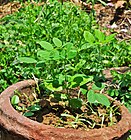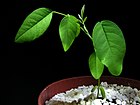Note: This is a project under development. The articles on this wiki are just being initiated and broadly incomplete. You can Help creating new pages.
Clitoria ternatea - Aparajita
Clitoria ternatea is a plant species belonging to the Fabaceae family. The flowers of this vine have the shape of human female genitals. Hence the Latin name of the genus "Clitoria" from "clitoris".
Uses
Chronic bronchitis, Migraine, Recurrent fever, Chronic cough, Tonsillitis, Abdominal pain, Hydrocele, Uterus Prolapse, Gonorrhoea, Heavy Periods, Hydrocele.
Parts Used
Chemical Composition
Major flavonol glycosides, 3-O-(2"-O-alpha-rhamnosyl-6"-O-malonyl)-beta-glucoside, 3-O-(6"-O-alpha-rhamnosyl-6"-O-malonyl)-beta-glucoside and 3-O-(2",6"-di-O-alpha-rhamnosyl)-beta-glucoside of kaemferol, quercetin and myricetin were isolated from the petals[1]
Common names
| Language | Common name |
|---|---|
| Kannada | Aparijata, Girikarnike |
| Hindi | Khagin |
| Malayalam | Sangu Pushpam |
| Tamil | Sankupushpam, Kakkanam |
| Telugu | Sankhu-pushpamu |
| Marathi | NA |
| Gujarathi | NA |
| Punjabi | NA |
| Kashmiri | NA |
| Sanskrit | Ghrstih, Aparajita, Radha, Adrikarni |
| English | Clitoria, Butterfly Bean |
Properties
Reference: Dravya - Substance, Rasa - Taste, Guna - Qualities, Veerya - Potency, Vipaka - Post-digesion effect, Karma - Pharmacological activity, Prabhava - Therepeutics.
Dravya
Rasa
Tikta (Bitter), Kashaya (Astringent), Katu (Pungent)
Guna
Laghu (Light), Ruksha (Dry)
Veerya
Sheeta (Cold potency)
Vipaka
Katu (Pungent)
Karma
Prabhava
Habit
Identification
Leaf
| Kind | Shape | Feature |
|---|---|---|
| Imparipinnate | Ovate | Leaf Arrangement is Alternate distichous, Leaf Apex is Obtuse, Leaf Base is Obtuse and Leaf Margin is Entire |
.[2]
Flower
| Type | Size | Color and composition | Stamen | More information |
|---|---|---|---|---|
| Solitary | 2-4cm long | Deep blue, occasionally white | 8-10 | Flowering from March-May |
Fruit
| Type | Size | Mass | Appearance | Seeds | More information |
|---|---|---|---|---|---|
| Oblong pod | Fruit is linear | Seeds 10-15 | Fruiting throughout the year | {{{6}}} |
Other features
List of Ayurvedic medicine in which the herb is used
Where to get the saplings
Mode of Propagation
How to plant/cultivate
Can be easily grown from seed. Butterfly pea is essentially a plant of the humid and subhumid tropical lowlands at elevations from sea level to around 1,600 metre [4]
Commonly seen growing in areas
Photo Gallery
References
- ↑ Chemical Constituents
- ↑ Kappatagudda - A Repertoire of Medicianal Plants of Gadag by Yashpal Kshirasagar and Sonal Vrishni, Page No. 133
- ↑ Ayurvedic preparations
- ↑ Cultivation details
External Links
- Ayurvedic Herbs known to be helpful to treat Chronic bronchitis
- Ayurvedic Herbs known to be helpful to treat Migraine
- Ayurvedic Herbs known to be helpful to treat Recurrent fever
- Ayurvedic Herbs known to be helpful to treat Chronic cough
- Ayurvedic Herbs known to be helpful to treat Tonsillitis
- Ayurvedic Herbs known to be helpful to treat Abdominal pain
- Ayurvedic Herbs known to be helpful to treat Hydrocele
- Ayurvedic Herbs known to be helpful to treat Uterus Prolapse
- Ayurvedic Herbs known to be helpful to treat Gonorrhoea
- Ayurvedic Herbs known to be helpful to treat Heavy Periods
- Herbs with Seeds used in medicine
- Herbs with Leaves used in medicine
- Herbs with Roots used in medicine
- Herbs with common name in Kannada
- Herbs with common name in Hindi
- Herbs with common name in Malayalam
- Herbs with common name in Tamil
- Herbs with common name in Telugu
- Herbs with common name in Sanskrit
- Herbs with common name in English
- Habit - A small shrub
- Index of Plants which can be propagated by Seeds
- Herbs that are commonly seen in the region of Tropical area
- Herbs
- Fabaceae









